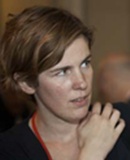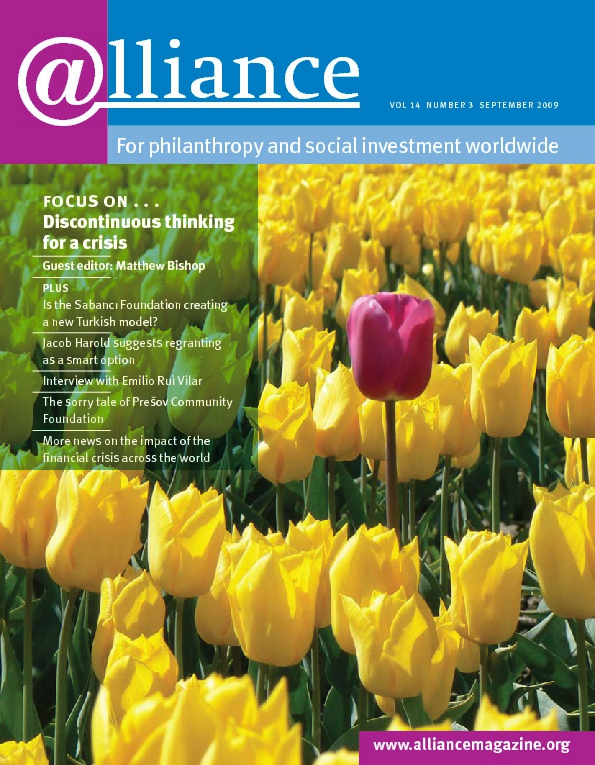‘Die Krisen räumen auf’ (‘Crises clear the decks’) wrote 19th century German historian Jakob Burckhardt, but what do they clear the decks for? How has the world changed as a result of the present financial crisis? How will philanthropy meet the challenges of the new situation and how can it take advantage of the opportunities it offers?
Since good ideas don’t come only from established leaders, Alliance asked a number of less well known people in European foundations for their views and their ‘big ideas’ on how foundations might take the chance to do things differently.
 How has the world changed? Two of our respondents don’t think that it has. ‘The world has not changed that much, in my opinion,’ says Rui Goncalves of the Calouste Gulbenkian Foundation. ‘The most dramatic world problems remain basically the same [security, food, health, migration and environment]. What has changed immensely is the scale of everything, from the threats to their confirmation.’ Likewise Karisia Gichuke of the Diana Princess of Wales Memorial Fund. While she concedes that for many foundations the effects of this particular ‘bust’ are unprecedented, ‘the grass-hurting, elephant-trampling cycle where the vulnerable bear the brunt of poor decision-making by the powers that be is nothing new. Financial systems, based on trust, are by their very nature fragile. There has been boom before, and bust, and boom and bust there shall be again.’
How has the world changed? Two of our respondents don’t think that it has. ‘The world has not changed that much, in my opinion,’ says Rui Goncalves of the Calouste Gulbenkian Foundation. ‘The most dramatic world problems remain basically the same [security, food, health, migration and environment]. What has changed immensely is the scale of everything, from the threats to their confirmation.’ Likewise Karisia Gichuke of the Diana Princess of Wales Memorial Fund. While she concedes that for many foundations the effects of this particular ‘bust’ are unprecedented, ‘the grass-hurting, elephant-trampling cycle where the vulnerable bear the brunt of poor decision-making by the powers that be is nothing new. Financial systems, based on trust, are by their very nature fragile. There has been boom before, and bust, and boom and bust there shall be again.’
Well, if the world has not changed much, what about the foundation world? According to Nele Verbruggen of the King Baudouin Foundation, ‘since financial resources are less available both from foundations and from governments, organizations’ needs are all the bigger and our capacity to help is all the more limited.’
What is to be done?
That being the case, ‘we might have to focus much more on making sure these organizations don’t need us’. Given that NGO demand far outstrips foundation supply, now more than ever, ‘I feel like encouraging NGOs to look for their money elsewhere. Be creative, go out there, make sure you can sell things or services, make yourself a website (some of them don’t even have that – because it’s not relevant for their core work!), collect donations … I believe that there’s a lot of money out there from individuals wanting to donate. But organizations don’t reach out to them.’
For foundations, this means that ‘instead of giving small grants (which at the end of the day could be frustrating, because they allow organizations to survive but keep them caught in this survival mode), we could start to seriously invest in helping them not to need us. We could give grants, but for activities that generate more income.’ The sources of funding for organizations in Belgium are ‘few and not diverse’, a situation that is ‘not sustainable’. The foundation ‘could play a role in raising awareness about that and in encouraging organizations to do something about it’.
This would of course have implications nearer home: ‘It’s a different way of working, and would, for example, require a change of staff skills. These are important decisions that will never be taken hastily. But it’s important to challenge the way we work, before others start doing it.’
The ‘cleaning effect’ of the crisis
‘The first opportunity for foundations is to focus,’ believes Rui Goncalves, ‘to discard irrelevant projects and programmes and think where and how they can be more effective and have more impact. For those foundations established in perpetuity, they should do less but more wisely, avoiding overlapping with other organizations and fostering partnerships with all the sectors.’ In words strikingly similar to those of Burckhardt quoted in the opening paragraph, he remarks that, ‘the crisis has also a “cleaning” effect, meaning that only the “fitter” and more “meaningful” will survive.’
 Karisia Gichuke, too, adduces a number of lessons foundations might draw from the crisis. ‘Don’t participate in the greed,’ she urges. Given their dependence on the financial system, foundations should help to ensure that ‘irresponsible and unwise decision-making is curbed, by well-considered and responsible, even cautious, investment of their assets’. Again a matter of responsibility, they should foster a culture of accountability, both in their own activities and in those of the organizations they fund. ‘Consider also,’ she urges, ‘how you invest resources, and that the principled advancement of social goals is as significant as financial goals in this decision-making.’
Karisia Gichuke, too, adduces a number of lessons foundations might draw from the crisis. ‘Don’t participate in the greed,’ she urges. Given their dependence on the financial system, foundations should help to ensure that ‘irresponsible and unwise decision-making is curbed, by well-considered and responsible, even cautious, investment of their assets’. Again a matter of responsibility, they should foster a culture of accountability, both in their own activities and in those of the organizations they fund. ‘Consider also,’ she urges, ‘how you invest resources, and that the principled advancement of social goals is as significant as financial goals in this decision-making.’
Get off the nest egg
The financial crisis has shown two more things, she believes. First, that ‘foundations’ assets lie beyond the financial’. They should consider how they can use their non-financial assets: ‘they have an advocacy role and a voice and can open doors and create alliances.’ Second, the crisis has shown how vulnerable foundations are ‘to rapid and substantial depletion of their assets, with attendant grave repercussions for their grantees and causes they support’. Broaching a debate that the crisis has thrown into higher relief, she urges foundations to ‘get off the nest egg’ and consider seriously ‘the rationale for sustaining foundations in perpetuity versus the substantial impact that can be made in the short term by the choice to spend out one’s endowment’.
Supporting research and education in developing countries
In addition to ideas about how foundations should go about their business, some of our respondents came up with very specific programme ideas. Rui Goncalves suggests that ‘philanthropic organizations should urgently support a study on the impact [and possible outcomes] of social networks on democracy’, since the internet and online social networks ‘present interesting opportunities and challenges to representative democracy and the way people can participate in the democratic [economic and even philanthropic] processes. For philanthropy, “smart giving” and online platforms of social investments are good examples.’
 Detlef Hanne of VolkswagenStiftung foresees that foreign aid will be reduced as a result of the crisis because it is usually linked to GDP. ‘Also,’ he adds, ‘there will be less funding directed to developing countries because the industrialized countries will be under pressure to keep the money to mitigate the effects of the crisis in their own countries.’ Research and higher education will suffer because they will not be of high priority, with the result that the ‘brain drain’ from South to North will increase, with the migration of ‘many, mainly young scholars’.
Detlef Hanne of VolkswagenStiftung foresees that foreign aid will be reduced as a result of the crisis because it is usually linked to GDP. ‘Also,’ he adds, ‘there will be less funding directed to developing countries because the industrialized countries will be under pressure to keep the money to mitigate the effects of the crisis in their own countries.’ Research and higher education will suffer because they will not be of high priority, with the result that the ‘brain drain’ from South to North will increase, with the migration of ‘many, mainly young scholars’.
How to counter this? ‘First of all, project funding needs to be more long-term in order to provide real opportunities for scholars in the South. Also, more funds need to go directly to the southern partners. Second, there must be stronger links between international research institutions and national universities and research centres. Third, research institutions in the South must be given additional and sustainable institutional support.’ This, he suggests, could be achieved by creating trust funds for ‘promising and successful research institutions in the South’ since, at a time of scarcity of resources especially, ‘stable funding and institutional security are of the utmost importance in developing countries’.
In the long term, he believes, such trust funds will prove their worth. ‘The southern partners will be enabled to set their own priorities … and they will be – maybe for the first time – able to develop their own strategic plans.’ Much of the money for this, he admits, will have to come from governments or multilateral funders, but, he believes, ‘private foundations could play an important role in the management of such funds, and they could provide start-up grants.’
‘Altogether,’ believes Detlef Hanne, ‘the current crisis will offer the chance to overcome the barriers between foundations and between philanthropic and government organizations, because the shortage of funds will force them to collaborate.’
The time is now
 Dictionary definitions tell us that a crisis is a turning point or decisive moment. The implication is that when it is past, things will be changed. However the world looks in the aftermath of the present crisis, our respondents generally believe that foundations cannot and should not continue to work the way they have done in the past – whether this means making longer-term investments, effectively ‘retooling’ to encourage grantees’ independence, or moving towards a limited-life option. ‘When the world around you changes,’ wonders Nele Verbruggen, ‘don’t you have to rethink what it means to “add value”?’
Dictionary definitions tell us that a crisis is a turning point or decisive moment. The implication is that when it is past, things will be changed. However the world looks in the aftermath of the present crisis, our respondents generally believe that foundations cannot and should not continue to work the way they have done in the past – whether this means making longer-term investments, effectively ‘retooling’ to encourage grantees’ independence, or moving towards a limited-life option. ‘When the world around you changes,’ wonders Nele Verbruggen, ‘don’t you have to rethink what it means to “add value”?’
While hopeful that ‘the introspection and self-critical thinking that this recession has produced could bring some changes for the better to the world’, Karisia Gichuke warns that the present soul-searching among foundations is likely to have ‘a short sell-by date’. The time, in other words, is now.
Andrew Milner is Alliance Associate Editor. Email am@andrewmilner.free-online.co.uk
Alliance would like to thank the following for contributing to this article:
Rui Goncalves Deputy of the Office of the President, Calouste Gulbenkian Foundation, Portugal
Karisia Gichuke Programme and Policy Officer, Diana, Princess of Wales Memorial Fund, UK
Detlef Hanne Program Manager, Africa-Initiative, Earth and Environmental Sciences,
VolkswagenStiftung , Germany
Nele Verbruggen Project Manager, King Baudouin Foundation, Belgium
The views expressed in this article are those of the authors and not of the institutions they are affiliated with.





Comments (0)